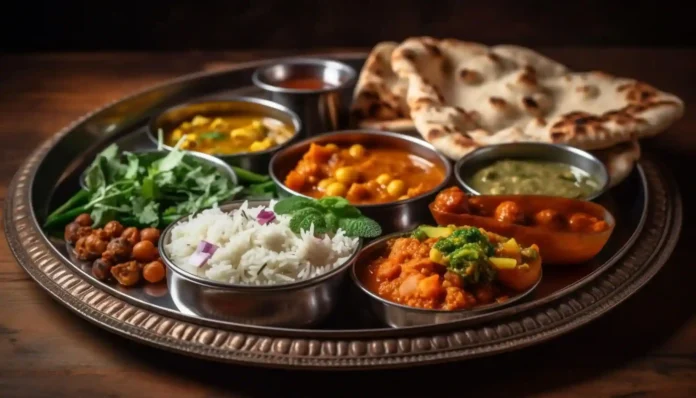Home-cooked meals are widely considered healthier alternatives to eating out. However, the Indian Council of Medical Research (ICMR) has highlighted that these meals can still pose health risks if not prepared carefully. The latest dietary guidelines from ICMR emphasize that excessive use of fat, sugar, or salt in home-cooked foods can negate their health benefits.
ICMR’s guidelines state, “Even home-made foods may become unhealthy if prepared with high fat, high sugar, or salt.” This advisory aims to raise awareness among individuals who believe that cooking at home automatically ensures a nutritious diet. The ICMR’s findings indicate that the ingredients and cooking methods used at home play a crucial role in determining the healthiness of the food.
Dr. Ramesh Kumar, a nutritionist at AIIMS, explains that while home cooking allows for better control over ingredients, it does not always lead to healthier meals. “People often use large amounts of butter, oil, sugar, and salt to enhance the taste of their dishes. These ingredients, when consumed in excess, contribute to various health issues such as obesity, hypertension, and diabetes,” he says.
The ICMR recommends adopting healthier cooking practices to mitigate these risks. This includes using oils sparingly, opting for healthier fats like olive oil or mustard oil, and avoiding trans fats. Reducing sugar intake and using alternatives such as honey or jaggery in moderation can also help. Additionally, the use of herbs and spices instead of excessive salt can make meals both tasty and healthy.
The guidelines also stress the importance of portion control. Overeating, even healthy home-cooked food, can lead to weight gain and related health problems. Dr. Kumar advises, “Pay attention to serving sizes and try to incorporate a balanced diet that includes plenty of fruits, vegetables, whole grains, and lean proteins.”
ICMR’s guidelines serve as a reminder that mindful eating and cooking practices are essential for maintaining good health. While home-cooked meals can be healthier, it is crucial to avoid excessive use of unhealthy ingredients and adopt balanced, nutritious cooking habits. By making these small changes, individuals can ensure that their home-cooked meals contribute positively to their overall well-being.
Home-cooked meals are widely considered healthier alternatives to eating out. However, the Indian Council of Medical Research (ICMR) has highlighted that these meals can still pose health risks if not prepared carefully. The latest dietary guidelines from ICMR emphasize that excessive use of fat, sugar, or salt in home-cooked foods can negate their health benefits.
ICMR’s guidelines state, “Even home-made foods may become unhealthy if prepared with high fat, high sugar, or salt.” This advisory aims to raise awareness among individuals who believe that cooking at home automatically ensures a nutritious diet. The ICMR’s findings indicate that the ingredients and cooking methods used at home play a crucial role in determining the healthiness of the food.
Dr. Ramesh Kumar, a nutritionist at AIIMS, explains that while home cooking allows for better control over ingredients, it does not always lead to healthier meals. “People often use large amounts of butter, oil, sugar, and salt to enhance the taste of their dishes. These ingredients, when consumed in excess, contribute to various health issues such as obesity, hypertension, and diabetes,” he says.
The ICMR recommends adopting healthier cooking practices to mitigate these risks. This includes using oils sparingly, opting for healthier fats like olive oil or mustard oil, and avoiding trans fats. Reducing sugar intake and using alternatives such as honey or jaggery in moderation can also help. Additionally, the use of herbs and spices instead of excessive salt can make meals both tasty and healthy.
The guidelines also stress the importance of portion control. Overeating, even healthy home-cooked food, can lead to weight gain and related health problems. Dr. Kumar advises, “Pay attention to serving sizes and try to incorporate a balanced diet that includes plenty of fruits, vegetables, whole grains, and lean proteins.”
Incorporating a variety of food groups in each meal is another crucial aspect. Nutritionists recommend that half of your plate should consist of vegetables and fruits, while the other half should be divided between lean proteins and whole grains. This ensures that you are getting a broad spectrum of nutrients necessary for maintaining good health.
Another key point is the method of cooking. Techniques such as baking, steaming, grilling, and sautéing are healthier options compared to deep-frying or excessive use of oil. Steaming vegetables, for example, helps retain their nutrients better than boiling them. “Healthy cooking methods preserve the nutritional value of the food and reduce the intake of unhealthy fats,” Dr. Kumar highlights.
Hydration is also a critical element often overlooked in discussions about diet. Consuming adequate water and hydrating beverages like herbal teas or infused water can aid digestion and improve overall health. Sugary drinks and excessive caffeine should be minimized as they can lead to dehydration and other health issues.
Moreover, the cultural tendency to celebrate with food, especially desserts and rich dishes, should be approached with balance. While it is important to enjoy these moments, moderating portion sizes and frequency can help manage the intake of sugar and unhealthy fats.
Lastly, planning meals and preparing ingredients in advance can help in maintaining a healthy diet. Batch cooking and storing portions for later use can prevent the temptation of opting for unhealthy takeout options during busy times. “Meal planning allows for better control over what you eat and ensures you have healthy options readily available,” says Dr. Kumar.
ICMR’s guidelines serve as a reminder that mindful eating and cooking practices are essential for maintaining good health. While home-cooked meals can be healthier, it is crucial to avoid excessive use of unhealthy ingredients and adopt balanced, nutritious cooking habits. By making these small changes, individuals can ensure that their home-cooked meals contribute

